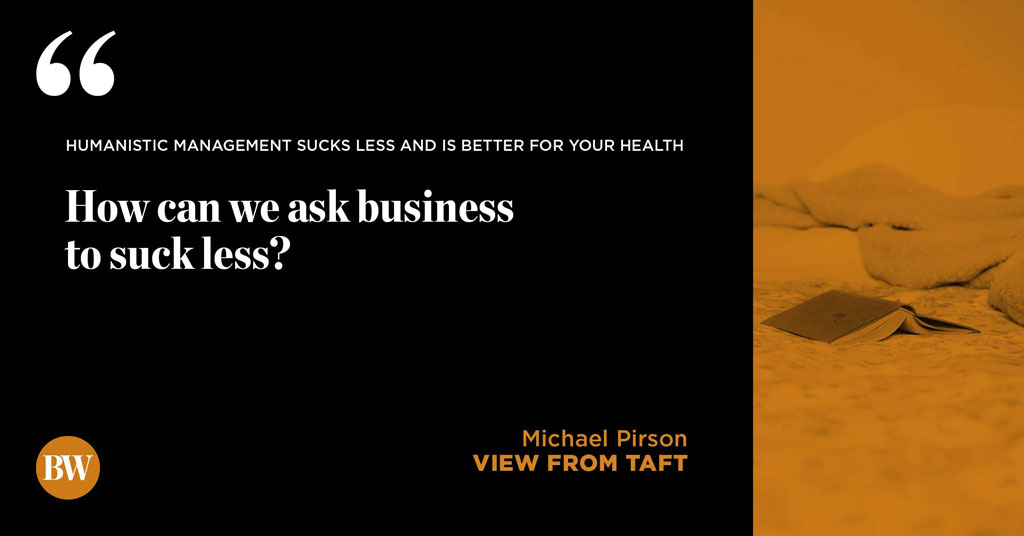Submitted by Ben Teehankee of De La Salle University

The View From Taft
By Michael Pirson

How are you doing? How well did you sleep last night?
Being asked about your well-being and the quality of your sleep may reveal important insights for good organizing practices. If these questions are asked with authentic curiosity, the resulting insights could transform businesses. That is at least what more and more CEOs are finding out.
Not so long ago, Arianna Huffington, co-founder and editor-in-chief of the Huffington Post, had a breakdown caused by sleep deprivation. Since then, she has become an advocate of the importance of sleep.
She argues that “we are in the midst of a sleep deprivation crisis, with profound consequences to our health, our job performance, our relationships and our happiness. What we need is nothing short of a sleep revolution: only by renewing our relationship with sleep can we take back control of our lives.”
There is no lack of good sleep advice; still, business culture seems to celebrate those who can operate tirelessly on four hours of sleep (and apparently, such people exist).
Enter Larry Fink, CEO of Blackrock, one of the world’s largest asset management companies. Fink commands close to $7 trillion under management. His company owns 3 to 7% of assets of most, if not every, publicly-listed company in the United States. Fink’s recent letter to CEOs reportedly caused sleepless nights. At the World Economic Forum in Davos and beyond, Fink’s letter became the conversation item — a signal that it had jolted business leadership awake. (Check out the letter here: http://bit.ly/finkletter).
If you read the letter, you might wonder that it would cause much fuss at all. Fink is asking CEOs to articulate more clearly their social purpose and to adapt their corporate governance systems to ensure long-term value creation.
Why should this be a problem?
I have talked a lot with my students and executives about the letter. They generally conclude that both social legitimacy and long-term-oriented corporate governance are at odds with current business culture. Business culture and business practice are widely thought of only in terms of short-term oriented profit maximization. People hate business because it neglects concerns about human dignity and well-being. Business ethics professor R. Edward Freeman calls this the “business sucks” narrative.
Freeman suggests that the “business sucks” story is one of the dominant modes of thought in society. It shows a profound mistrust and misunderstanding of the role of business. Freeman suggests that there reigns a dominant myth in society that business occupies the moral low ground, separate from ethics or a humanistic concern. How could one ever envision business as having a social purpose in that case? Freeman shows how the enactment of this story underlies business thinking among many managers and business theorists (including those who have trouble with Fink’s letter).
He concludes with a suggestion to rethink and reinvent this story along more realistic and more empowering lines. He also suggests that a humanistic, values-based form of capitalism, or stakeholder capitalism, offers a better way to understand the complex role that business does and should play in modern society.
In the light of Freeman’s suggestions, one could interpret Fink’s letter as a fundamental challenge to corporate executives to ditch the “business sucks” narrative. This is indeed a monumental task that can keep you up at night.
To highlight how widespread and deeply rooted this story is, let’s consider the case of Kevin O’ Marah, a business insider and columnist at Forbes. He writes: “I hate business but I love Larry Fink:”
“Business, especially in big, public companies is all about money. Executives have only one real duty: to maximize shareholder value. Lip service about other accountabilities notwithstanding, the fact is that C-level executives’ responsibility forces them to choose the path of highest risk-adjusted net present value.
This drives all kinds of objectionable behavior from exploitative labor practices and pollution to tax evasion. Individual executives may hate it as a matter of conscience, but they are expected to suck it up and, if necessary, do the dirty work.
Equity markets are soulless by design, with a harsh binary logic that recognizes only two signals: buy or sell. Harnessed, as it is now, to the frenetic news cycle of our digital age this engine has become increasingly ill-suited to long-term thinking.
At the limit we are tempting revolution by maniacally chasing profit at all cost. Politics reflects this dissatisfaction and is issuing a warning we’d be wise to heed.
It makes me fear for the future.”
O’Marah has high hopes for Larry Fink because he is asking business to suck less. And that may scare CEOs who have spent their lives in defending current practices.
For many other people, including social activists, Larry Fink’s letter is trivial, mattering only because of who is saying it. Much like O’ Marah, they hope that Fink’s exhortation can lead to a system that increases the well-being of all.
Michael Pirson is an Associate Professor of Management, Global Sustainability, and Social Entrepreneurship at Fordham University. He co-founded the International Humanistic Management Association, of which De La Salle University is a part.

